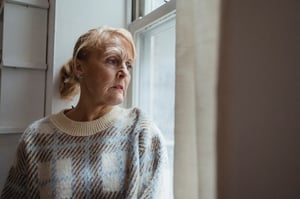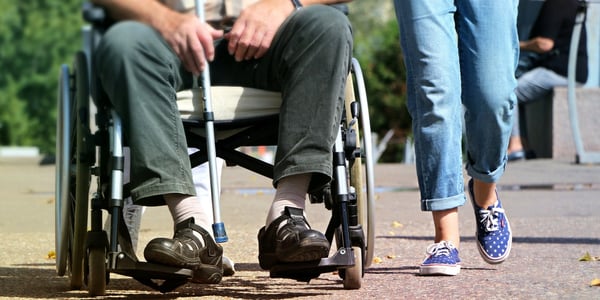As we get older, many things can happen to us. For some, it's arthritis, and for others… like me…...
Depression in Older Adults: How to Recognize the Signs
Depression is a mental health disorder that affects 15%–20% of adults older than age 65 in the United States, according to a report by the CDC. Depression can be difficult to identify because the symptoms are similar to typical signs of aging, such as fatigue and forgetfulness. In addition, depression often goes unnoticed or misdiagnosed because depression may not cause any noticeable changes in mood or behavior. Yet depression has severe consequences for older adults, including increased risk for falls, social withdrawal, cognitive impairment, physical dysfunction, and suicide. Knowing the warning signs of depression can help an older adult receive appropriate treatment before depression leads to further complications.
How to Identify Signs of Depression in Older Adults
The following points provide information on how you might recognize if someone has depression:
They Are Withdrawn and Don't Want to Socialize
 Older adults who suffer from depression may stop socializing, even with family members. Often, when older people are dealing with depression, they will minimize social engagement. This is because depression tends to make people feel very lonely, and they may begin to think that no one cares about them.
Older adults who suffer from depression may stop socializing, even with family members. Often, when older people are dealing with depression, they will minimize social engagement. This is because depression tends to make people feel very lonely, and they may begin to think that no one cares about them.
Older adults who suffer from depression will often stop doing things they used to enjoy, such as going out to social events or even just spending time with friends and family members. This is because depression tends to make them want to avoid social situations in general.
They Have a Lack of Energy
 One of the reasons depression is so common in older adults is that depression can develop over time. Many people suffer from depression for years before anyone realizes that they are depressed. In addition, depression can be challenging to spot in older adults because depression symptoms often differ from depression in younger people. In younger adults, depression causes problems with energy, concentration, and staying focused.
One of the reasons depression is so common in older adults is that depression can develop over time. Many people suffer from depression for years before anyone realizes that they are depressed. In addition, depression can be challenging to spot in older adults because depression symptoms often differ from depression in younger people. In younger adults, depression causes problems with energy, concentration, and staying focused.
Older adults who are depressed might have mood swings instead. They might experience intense emotions such as anger or sadness. Another difference between depression in younger and older adults is how likely it is that depression will go away on its own without treatment. Younger adults tend to recover more quickly than older adults do. This means that if you notice symptoms of depression in an older adult, it may be a good idea to talk to a doctor about depression treatment.
They Show Signs of Anger or Irritability
Some people with depression get angry or frustrated. They might yell at other people, scream, hit things, or be grumpy all the time. Also, if someone is in pain, depression can make them feel angry or irritable.
Why do people with depression often become angry or irritable?
- Depression can make someone feel sad or hopeless. Older adults who get angry are trying to cope with their depression. When people try to mask depression, they might cover it up by acting like a grump instead of feeling sad.
- Depression can also cause changes in the brain that lead to alterations in mood and behavior. In fact, brain imaging studies show depression can change the way an older person's brain looks.
- Depression can cause people to lose interest in things they usually enjoy, like hobbies or social activities. This kind of loss of interest is a symptom of depression and can make someone irritable and angry.
Their Sleep Patterns Change
They may sleep too much or not enough. Excessive daytime drowsiness is often observed in depression patients. Sleep disorders are common in depression patients, and depression can lead to sleep disorders as well. It's not uncommon for depression sufferers to suffer from insomnia, restless sleep, nightmares, or other sleep disturbances (anxiety and depression often cause poor or interrupted sleep). Depressives may sleep more than depression sufferers who are going through depression for the first time. This is often accompanied by a general malaise and/or low energy.
They Experience Changes in Appetite
 Older adults are at a higher risk of depression, and depression can affect appetite. This may be referred to as anorexia or depression-related cachexia. As depression worsens, older adults may eat less. They might refuse to eat anything, even if they have diabetes or another medical condition that requires eating regularly. This can lead to malnutrition.
Older adults are at a higher risk of depression, and depression can affect appetite. This may be referred to as anorexia or depression-related cachexia. As depression worsens, older adults may eat less. They might refuse to eat anything, even if they have diabetes or another medical condition that requires eating regularly. This can lead to malnutrition.
It is important to encourage older adults to eat, even if they do not want to. You can try offering them something small, like a few bites of a sandwich or some pudding. If that does not work, you should contact their physician immediately.
Depression in the elderly can be difficult to identify because it shares many of the same symptoms as aging. If you or your loved one is displaying any of these signs, please seek help from a doctor or therapist immediately. With treatment and support, people who have experienced depression for more than two weeks may regain their quality of life and independence. There is hope that they will not have to live with this debilitating disorder forever. It's essential to get an accurate diagnosis so you know how best to treat your condition. Talk to your healthcare provider about getting screened if you are showing signs of depression at any age.
Want more content like this? Subscribe to our blog!






